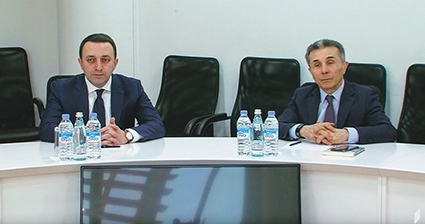Saving the Georgian Dream or Ivanishvili’s Dream?
Former Georgian Prime Minister Irakli Garibashvili will return to politics following a three-year political hiatus. Bidzina Ivanishvili announced the sudden decision on March 5 at a meeting of the political council of the ruling Georgian Dream party. However, does his surprise return to politics underline Ivanishvili’s undeniable grip on Georgian politics?
Garibashvili was Prime Minister of Georgia from November 2013 until his resignation in December 2015. Since stepping down from politics, Garibashvili remained mostly out of the public eye. It later emerged that Ivanishvili had advised him to resign from the position of Prime Minister.
Ivanishvili and Garibashvili have a close relationship. Garibashvili worked as a business executive in several of Ivanishvili’s companies for eight years before they both turned to politics. He will now replace Gia Volsky in the position of Political Secretary in Georgian Dream.
Many media outlets claim Garibashvili's return is an attempt to hold Georgian Dream together. In recent weeks, the party has lost its constitutional majority as several founding members of the party resigned. Politicians Eka Beselia, Gia Zhozholiani, Mirian Tsiklauri, Zviad Kvachantiradze, Levan Gogichaisvili and Gedevan Popkhadze have all quit the party since 21 February 2019.
Georgian Dream is keen to show a united front despite the recent spate of resignations. Speaking about his decision to return to politics on the evening talk show Reakcia, Garibashvili said, “Today our main objective is to unify and strengthen the party, my main mission would be, certainly together with the party chairman [Ivanishvili] and other leaders, to bring our party’s founders, deputies of the previous parliament, the first generation, and those of the new generation, closer together; to achieve better coordination and to, in the end, unite. This is my main mission, my main task.”
Garibashvili also underlined the crucial role of Ivanishvili in the party, saying that a Georgian Dream victory was “absolutely impossible and unimaginable without Ivanishvili”. He also stressed the need for a leader “who would unite and consolidate the political processes. Bidzina Ivanishvili “was, is, and will be this leader,” he argued.
However, despite Garibashvili’s support of Ivanishvili. his decision to return to Georgian politics could be seen to further demonstrate the grip Ivanishvili holds over the party and Georgian politics.
In the most recent edition of The Economist Intelligence Unit (EUI) Democratic Index Report, Georgia fell from 5.93 in 2017 to 5.50. The index credited Ivanishvili’s return to politics in May 2018 as a fuelling factor for the slip of democracy in Georgia as he has “redirected government policy.”
“The Prime Minister, Giorgi Kvirikashvili, resigned in June, citing his disagreements with Mr. Ivanishvili, rather than widespread popular discontent with the government, as the key factor in his decision,” read the report. “Under Mr Ivanishvili’s influence, the government also intervened in the second-round presidential election, offering a debt write-off to 600,000 citizens two weeks after election day. This appeared to provide the government with a sizeable campaigning advantage over the opposition.”
The strong ties between Ivanishvili and Garibashvili are undeniable. With Garibashvili’s return to Georgian politics, Ivanishvili has once again shown his influence within his party. With his influence and power, it is likely that Georgian Dream will recover from its loss of party members. However, questions remain as to whether Ivanishvili’s hold is damaging to Georgian democracy.
By Amy Jones
Image source: GPB












